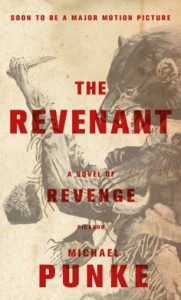“…the reader/listener not only gets a genuine sense of threat but also of man’s smallness in the grand scheme of things.”

Glass’ story is well-known in US mythology, representing as he does the idealised American male—self-sufficient, tough, never giving up—and Punke’s relating of the hardships he suffers and bests is certainly compelling. The writing is easy and deceptively simple, and he clearly researched in depth the lives of the early trappers and is able to communicate the perils they faced (not just indifferent nature, but attack parties of the native Americans as well as various sorts of wildlife—not least the enormous bear whose attack triggers this tale)—so that the reader/listener not only gets a genuine sense of threat but also of man’s smallness in the grand scheme of things.
The descriptions of Glass’ injuries are queasily realistic, and the characters of Glass and his companions ring true. Punke’s story drags the reader in Glass’ wake, never letting them catch breath or rest, and to reach the end of the tale is to reach a place of exhaustion and disbelief, that one man can go through so much and not be dead. In Punke’s hands, Glass becomes the kind of stoic, resourceful hero that we all probably secretly wish we were, overcoming terrible odds and injuries to triumph in the end, and we crawl with him every painful inch of the way. Similarly, when Punke describes the thoughts of the other characters they come across as accurate and realistically drawn, although as the constantly shifting points of view and detailed character backgrounds do risk somewhat straining the novel’s claim of being a true story as there’s no presentation of evidence for Punke’s assertions about how people felt or thought. In the end, though, this is a novel rather than a historical document, and should be approached as such: did Glass really go through what Punke, and the earlier reports, tell us he did? Ultimately, it’s impossible to know whether the stories are fully or merely partially accurate, but in the end it doesn’t seem to matter; Glass’ tale, real or otherwise, is one worth telling and one worth hearing.
As an audiobook, The Revenant works well. The sparse prose lends itself well to spoken performance, and narrator Jeff Harding (who also narrates the audiobooks of John Connolly’s Charlie Parker series, with its similarly tough, all-enduring hero) is excellent. He’s deeply American, the voice helping to set the scene well, redolent of the wide plains and deep forest that Glass inhabits, and his different voices for different characters are identifiable without being over-acted or descending in caricature. At just under 10 hours, the book is a good length, never outstaying its welcome, and is always entertaining (if mostly along the grimmest of lines).
Highly recommended.
SIMON KURT UNSWORTH
